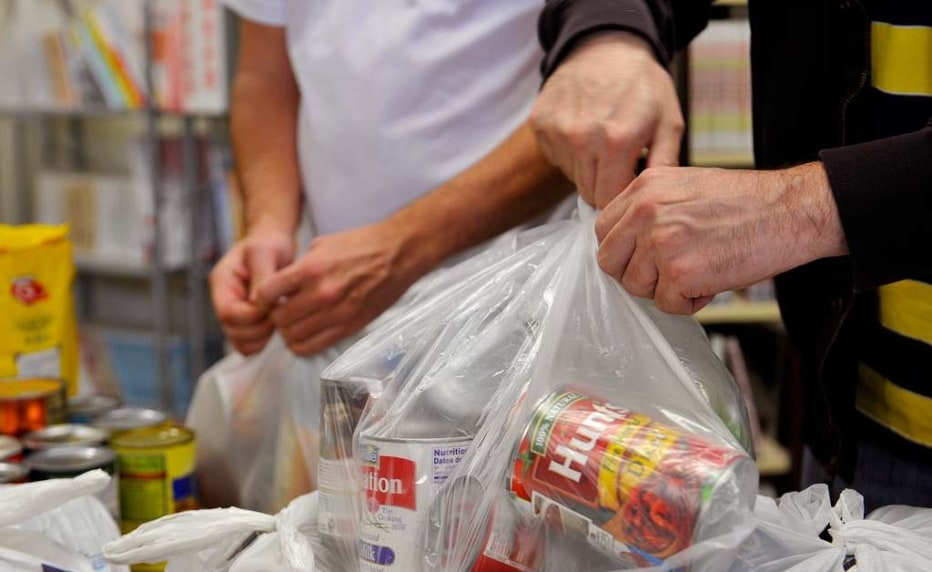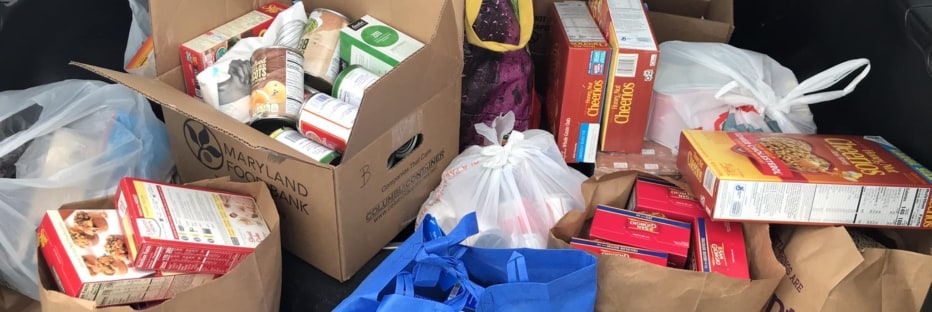
News & Announcements

Addressing Food Insecurity Through Cans and Creation
August 8, 2023
Jenny Hutton and Ron Gunderson share about the complexities of food insecurity and how Deacons and the Creation Care Team are tackling it head-on.
Why do we address food insecurity?
To start, we confess that the redeeming work of Jesus Christ “embraces the whole of man’s life: social and cultural, economic and political, scientific and technological, individual and corporate.” (Book of Confessions, 9.63). The good news of the Gospel isn’t just good news for some eternal, abstract, ethereal realm after death, but it is being born in this world around us. God’s Spirit is upsetting the unjust order of this world, restless for a planet that is saturated by the love, peace, and equity of Christ’s reign. Out of the abundance of our lives—social, cultural, economic, political, scientific, individual, corporate—we are able to participate in this work, too. Addressing food insecurity in Catonsville and our neighboring counties is part of God’s vision for a creation that is marked by abundant life, human flourishing, and shared responsibility for each other’s welfare.
The Presbyterian Church and food insecurity
The Presbyterian Hunger Program is an active initiative of the Presbyterian Mission Agency that seeks to eliminate the root causes of food insecurity while addressing the immediate needs of communities. The program coordinator, Rev. Rebecca Barnes, describes the unique mission of the church in this struggle: “When people are made poor and vulnerable or reduced to objects of pity, the church builds relationships of dignity and equality among all.”
The Presbyterian Hunger Program administers certifications for Earth Care Congregations, making us a part of this vital work. Earth care is directly related to issues of food insecurity and combats the underlying issues that contribute to it. In the same way that food insecurity is rooted in poverty, violence, exploitation, and greed, it is rooted in pernicious dominance over creation. Through sustainability, education, and advocacy, creation care reduces waste, disregard for natural resources, and often provides direct food assistance to neighbors experiencing food insecurity. As the effects of climate change reach a fevered pitch, earth care makes small but meaningful steps to protect our food supply.

How Deacons are addressing food insecurity locally
The Deacons and the Mission Committee restarted the Friday Food Collections beginning this past May in order to directly address local food insecurity. The two collections in May were amazing, filling two SUVs with contributions that went to The Westowne Elementary School to help families get through the summer months. The June collections went to the food pantry at Grace A.M.E., and as always, they expressed gratitude for the assistance.
Our Deacons have steadily strengthened our partnerships with Catonsville Emergency Assistance and Grace A.M.E. and recently formed a partnership with Westowne Elementary School. Whenever you see food collections advertised by our congregation, those donations are directly supporting our neighbors who visit the food banks. Collaborating with these organizations helps safeguard the effectiveness and impact of these donations, buoying their mission and work in Catonsville.
Be sure to mark your calendars for September 16, 2023. The “Fill The Truck” food drive will be back at the Knights of Columbus. The event will run from 9:00 a.m. to 1:00 p.m. and all collections will be divided between Grace A.M.E. and Catonsville Emergency Assistance. This drive has been a huge success in the past and really helps the pantries gear up for the Thanksgiving and Christmas holidays. Consider coming out to donate any non-perishable goods. If you would like to volunteer to help at this event, please stay tuned for a sign up sheet coming soon.
 Creation Care and food insecurity
Creation Care and food insecurity
There are more ways to combat food insecurity, too. Consider participating in creation care. Reducing waste, building sustainability, and caring for the natural world helps address the root causes of food insecurity. It protects our planet from the worst effects of climate change, extreme heat, and rising global temperatures. The planet’s ability to produce food is in danger, and we’re all called to soothe its cries.
We began a partnership with Design With Naturel last year, and it is now evident in a major reduction in the presence of invasive plants. This partnership is creating an opportunity for the native plants to spread and thrive, key components of a balanced ecosystem that is resilient to climate change.
Another key way to combat our planet’s rising temperatures and its effect on food insecurity is to plant trees. The 30 trees recently planted across our grounds by Howard EcoWorks were faithfully watered during the drought of May and June. They are doing well now that a wetter pattern has emerged. The watering team will continue to monitor the trees and water as necessary. Thanks to this intensive but important labor, 15 metric tons of carbon dioxide emissions will be sequestered from the planet’s atmosphere over the lifetime of these trees (according to the National Forest Foundation). Mitigating the effects of warming temperatures will help avert the worst scenarios for food insecurity, preventing future devestation that could topple global food supplies.
We hope and labor for a better Catonsville
Ending food insecurity is complex, and we may never be able to end it in our lifetimes. But despite the complexity of its root causes, we can strive to weaken its hold in Catonsville and our surrounding counties.